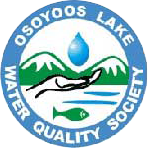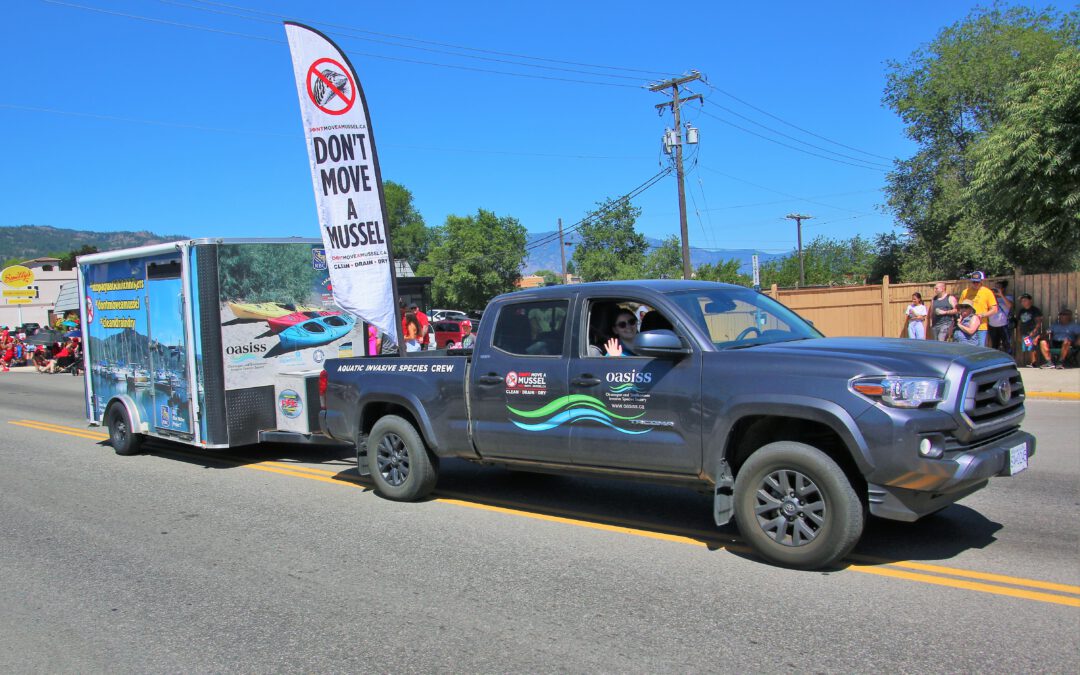“Each year the valley attracts thousands of boaters from outside the province,” says Lisa Scott, Executive Director of OASISS. “It would only take one contaminated boat to start an infestation. Invasive mussels could have lasting negative impacts to our lakes, as we have seen in other parts of Canada.”
In advance of the busy boating season, the Okanagan and Similkameen Invasive Species Society (OASISS) and the Okanagan Basin Water Board (OBWB) want to remind everyone to clean, drain and dry their watercraft. And, if you have family or friends bringing any type of watercraft into the province, including kayaks and paddleboards, to make sure to stop at all mussel inspection stations along the way.
For 11 years, OASISS has been helping deliver the OBWB’s Don’t Move a Mussel campaign. The campaign aims to raise awareness of the impacts of invasive mussels and how everyone can help to protect Okanagan lakes from invasive zebra and quagga mussels.
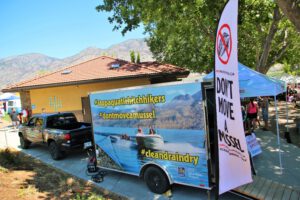
To date, there have been no reported introductions of live zebra or quagga mussels into B.C. lakes and the organizations hope to keep it that way. Once introduced to a waterbody, invasive mussels can rapidly multiply and form dense colonies, leading to significant ecological and economic consequences.
“Each year the valley attracts thousands of boaters from outside the province,” says Lisa Scott, Executive Director of OASISS. “It would only take one contaminated boat to start an infestation. Invasive mussels could have lasting negative impacts to our lakes, as we have seen in other parts of Canada.”

Zebra and quagga mussels are non-native freshwater mollusks that are originally from Eastern Europe and Western Russia. They were first introduced to Canada in the late 1980s and since then, have spread into lakes and waterways around North America, mainly by contaminated watercraft.
In regions where they have already established, invasive mussels damage sensitive ecosystems, clog water intake pipes and water infrastructure, ruin beaches, reduce water quality and impact tourism. The cost of a mussel invasion would be staggering. A recent provincial report said that a zebra and/or quagga mussel infestation would cost B.C. between $64 million and $129 million annually.
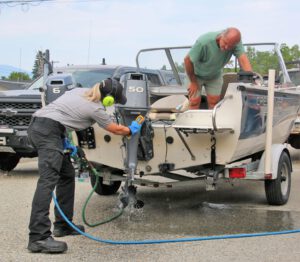
Photo Credit Neil Bousquet
“This threat is very real,” says Anna Warwick Sears, Executive Director of OBWB. “Invasive mussels could devastate our beloved lakes, which are not only a source of recreation, but also our drinking water and critical to fish and the larger ecosystem. Our organizations are committed to raising awareness about
the importance of preventing an invasive mussel introduction, and we encourage the community to join us in this critical endeavour.”
Thanks to OBWB funding, OASISS staff will once again be at boat launches, community events, youth camps and other key locations this summer. They will share the importance of stopping at inspection stations and to clean, drain and dry watercraft and gear.
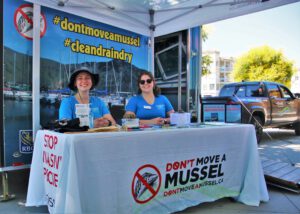
For further information on invasive mussels and how to take action, visit www.DontMoveAMussel.ca
Media Contacts:
Lisa Scott, Executive Director
Okanagan and Similkameen Invasive Species Society 250-490-7572
Corinne Jackson, Communications Director
Okanagan Basin Water Board 250-469-6271
About the Okanagan and Similkameen Invasive Species Society (OASISS) www.oasiss.ca
https://www.facebook.com/invasivespeciessociety
https://www.instagram.com/okanaganinvasives
OASISS is a non-profit organization that has been actively participating in prevention, detection and management of invasive plants in the Okanagan-Similkameen since 1996. Efforts have targeted provincially and regionally noxious species listed under the BC Weed Control Act, and other aggressive invasive plants.
In 2012, society members opted to change the constitution to encompass invasive species (largely due to the threat of invasive mussels), and subsequently changed the name of the society. OASISS addresses invasive species and their pathways of spread by prioritizing management areas and species through multi-stakeholder cooperative coordination.
The Society is also actively involved in public education and outreach initiatives and community stewardship programs that involve on-the-ground action. The role of OASISS is to encourage and facilitate agency coordination, prioritize management activities, coordinate/evaluate on-the-ground treatment and to provide public information programs for invasive species management. Prevention and education are considered priority management activities.
About the Okanagan Basin Water Board
www.OBWB.ca
https://www.facebook.com/OkWaterWise/
https://www.instagram.com/okanagan_waterwise/
https://twitter.com/okwaterwise
The Okanagan Basin Water Board (OBWB) is a local government agency which was instituted in 1970 as a collaboration of the three Okanagan regional districts to provide leadership on water issues spanning the valley. Advised by an innovative cross-disciplinary council, the board delivers programs and activities to promote coordinated water management throughout the basin.
In 2010, the OBWB launched its Okanagan WaterWise outreach and education program (https://OkWaterWise.ca/), aimed at raising awareness for various water issues in the valley and supporting Okanagan residents to protect the region’s water supply. The Okanagan WaterWise program delivers two campaigns, Make Water Work (an outdoor residential water conservation campaign) and Don’t Move A Mussel (elevating awareness of invasive mussels and protection of waterways). In addition to its Don’t Move A Mussel campaign, the OBWB has effectively lobbied for mussel inspection stations and other resources to protect B.C. waterways, and this effort continues.
For more information on the B.C. Watercraft Inspection Stations
https://www2.gov.bc.ca/gov/content/invasive-mussels
All Photo Credits: Neil Bousquet
